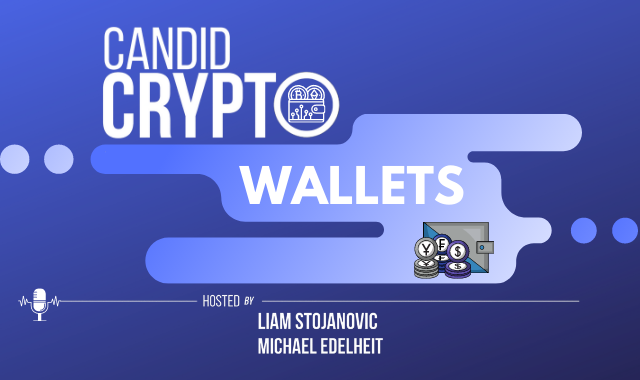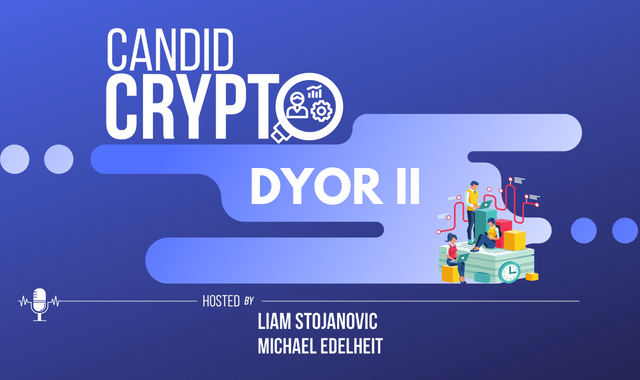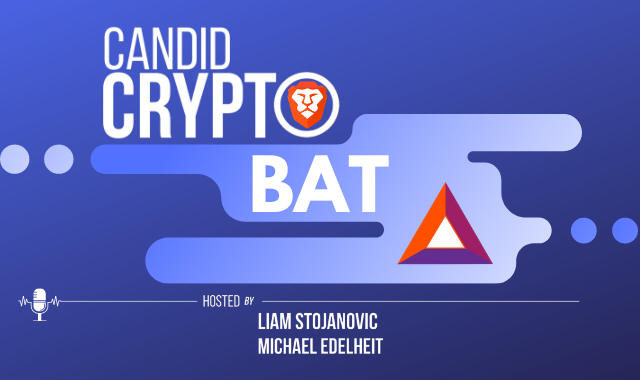010: Wallets
Cryptocurrency wallets. “Not your keys, not your coins”.
Please leave a comment and let us know what you think about this episode. You can find Candid Crypto on all your favorite podcast platforms, so please like and subscribe to stay up to date on everything crypto!
In addition, every Candid Crypto episode is transcribed so you can easily understand everything that was discussed.
Episode Transcription – Wallets
Liam 00:01
Welcome to Candid Crypto, a place where anyone can learn about Blockchain Tech.
Michael 00:08
We are two friends who love cryptocurrency and have acted as retail investors and researchers for years. I’m Michael.
Liam 00:16
And I’m Liam. Our goal is to create a community where listeners can build their knowledge and meet like-minded people in the digital asset space. Action!!
Michael 00:30
On today’s episode, Liam and I are going to be talking about Cryptocurrency wallets. And if you’re a more advanced user, you might be thinking this is a pretty basic topic. But we have found by talking to listeners and others about cryptocurrency that a lot of people do not know how to properly store their cryptocurrency.
So what’s the point of being your own bank with crypto if anybody can come and steal out of your vault? So we’re going to be going through all the basics when it comes to cryptocurrency wallets, so you can better manage and know that your cryptocurrency is secure.
Liam 01:12
What is a Cryptocurrency Wallet?
Michael 01:16
A Cryptocurrency Wallet, also referred to as a Bitcoin wallet or just a crypto wallet functions like a traditional wallet, but instead of paper currency, it holds proof of your digital assets, and a wallet stores the public and private keys required to buy Bitcoin or any other cryptocurrency and provide a digital signature authorizing each transaction.
So Liam, what exactly is a public and private key?
Liam 01:46
So the public private key pair scheme is used across all cryptocurrencies to allow people to send each other crypto, and for them to spend it from their wallets. You can think of a public key as an email address, anyone in the world can send you an email, aka crypto, but only you are the recipient and the viewer of all those transactions. In essence, when you receive crypto on your public key, you need your private key to send money away from that public key.
So public keys are literally just the addresses and I’m going to drag a for the YouTube video viewers. This is exactly what a bitcoin address looks like. This one is preceded by BC 1 [phonetic 02:34]. But in essence, the syntax for all of them is the same. And those are generated when you create a new wallet.
Michael 02:43
And these digital wallets can be a device. It can be a program on an app or even an online website. And sometimes they’re offered by crypto exchanges themselves. If there’s anything to take away from this episode, is to keep your private key safe and secure. Your private key allows you to unlock your crypto wallet in order to trade or spend your cryptocurrency.
Liam 03:12
Not your keys, not your coins. If there’s anything we can hammer out; it is that.
Michael 03:19
Absolutely. So Liam, do you need a crypto wallet to buy and trade Bitcoin?
Liam 03:25
Technically, no, but it’s a good practice to have your own wallet. The reason I say technically no is you could purchase your Bitcoin off of Coinbase and keep it on your Coinbase wallet indefinitely. But when you do that you’re trusting Coinbase to never lose your funds. And always report accurately how many Bitcoin you have. In essence, what you want to look out for is exchanges that do not let you withdraw. Robinhood!! Robinhood claims that you can purchase crypto, and then you can sell it, but you can’t actually withdraw it. And to me, that goes against the tenants of cryptocurrency, not your keys, not your coins. You don’t own it. Robinhood claims you own it, but do you?
Michael 04:15
So if you never send your coins out of the exchange, is it at risk of being lost if the exchange got hacked?
Liam 04:24
Yeah. And those funds are typically not insured. So you would lose all the cryptocurrency you had if an exchange was compromised.
Michael 04:35
So what happens when it comes to DeFi? You’re essentially sending your funds to a public address that you don’t own.
Liam 04:42
The entire premise for loaning your cryptocurrency is that you make very competitive returns on your cryptocurrency when you do so, you take on the risk that that platform is hacked or compromised somehow, which happens at the end of the day when you put your coins into the DeFi ecosystem, and you stake them or you borrow against them, there is a risk that platform could disappear or that your funds could disappear. And then you are S O L, because not your keys, not your coins.
Michael 05:15
Okay. So I mentioned that it kind of comes in a variety of formats. So what are the different types of crypto wallets?
Liam 05:25
Simplistically, there are two types.
There are Hot Wallets, also known as software wallets. Hot Wallets contain the private key in a digital format. So you create, say, a new wallet through a browser extension through a mobile app or through a desktop app, the private keys for all of your crypto addresses are stored on your computer. Now, most people’s computers aren’t littered with malware. And typically it’s okay to do that. However, if you’re dealing with a lot of funds, you want to migrate your crypto to what is known as cold storage, or a hardware wallet. On a hardware wallet, the private keys never, never leave the device, there is no representation of your wallet as a file on a computer. The private keys are only on that device. And you can only send cryptocurrency from your public addresses if you have that device plugged in and unlocked.
Michael 06:24
We don’t provide financial advice. But we want to provide the most educational advice that we can when it comes to cryptocurrency and we always, if you’re working with a large amount of funds in crypto, go with a Hardware Wallet and go with a Cold Storage Wallet. It is more secure, and reliable. Do you have any recommendations of what exactly you use?
Liam 06:52
Yeah, so I use the Trezor, T-R-E-Z-O-R, I like the Trezor a lot. Because the software and the firmware is continuously updated. They add support for different cryptocurrencies and different functionality. And in addition, I know for a fact that even if my computer has a virus or has malware, and then I send funds from my treasure to connect it to the computer that is infected, I won’t lose my money because the private keys never leave the device that is such an important thing. It just adds a lot of peace of mind to my crypto stash.
So practically, when you have this device like a treasure you… to use a pin or passphrase to secure the device. And the most important part is that even if you lose that Hardware Wallet, you don’t lose your funds. When you set up a Trezor, the device makes you write down your seed phrase on a piece of paper. It’s so important that you never take a picture of this, that you never put it into a Google Doc, that you never tweeted out, nothing. You put it on a piece of paper and you keep that piece of paper somewhere secure somewhere where it won’t get tampered with, or get lost or catch on fire or get wet.
Michael 08:10
Okay, and in the end of the day, when it comes to securing your Bitcoin, your Ethereum whatever cryptocurrency you have, the security really comes down to you. And if you’re a beginner, you might get a little lost and it might be a little intimidating to understand. You know what is best for me. Do you have any advice for people trying to understand what’s best for their situation?
Liam 08:44
Yes, they should check out CandidCryptoPodcast.com/consulting. We are unrolling candid crypto consulting on July 2, 2021.
Our value offering is pretty simple. We are not financial advisors and we do not offer investment advice. We also are not custodians of your funds. Rather, we just show you the most intelligent, up-to-date best practices for keeping your cryptocurrency secure and generating a yield on your crypto if you wish.
Michael 09:18
And when it comes to crypto and your personal strategy, it really comes down to the individual. A combination of hot wallets and cold wallets might be best for you. Or if you’re purely long term and you have no interest in trading anytime soon. Maybe just throw it all in a cold wallet and throw it in a deposit box somewhere where you know no one’s going to touch it.
Liam 09:42
And there are all sorts of other quirky ways you can keep your funds secure. There are Social Recovery Wallets [phonetic 09:49], which require you to consult with multiple people prior to releasing funds. There are also things like multi signature wallets where you have to have multiple people bring in people Have a wallet in order to create the entirety of it again, there are many different avenues you can pursue when it comes to securing your cryptocurrency. And if you wish to know more, please check out CandidCryptoPodcast.com/consulting. That live launch will occur in one week. And we encourage you to get in touch with us Hello @CandidCryptoPodcast.com. Or go to our website and check out our various social media links.
Michael 10:29
We hope you enjoyed today’s episode. As always, please reach out to us if you just want to pick our brains a little bit more. Or if you have any comments about the content that we shared, CandidCryptoPodcast.com. And you can also find us on all your favorite social media sites. And make sure to like, subscribe, follow, whatever you can do to keep up to date with all our new content.
Liam 10:57
Thank you so much for tuning in this week. We look forward to you joining us on our full launch of Candid Crypto consulting next week. And stay tuned for all sorts of other goodies we have cooki. Thank you, everyone.
Michael 11:12
Not your keys, not your coins.
Liam 11:13
Not your keys, not your coins. Remember that.







